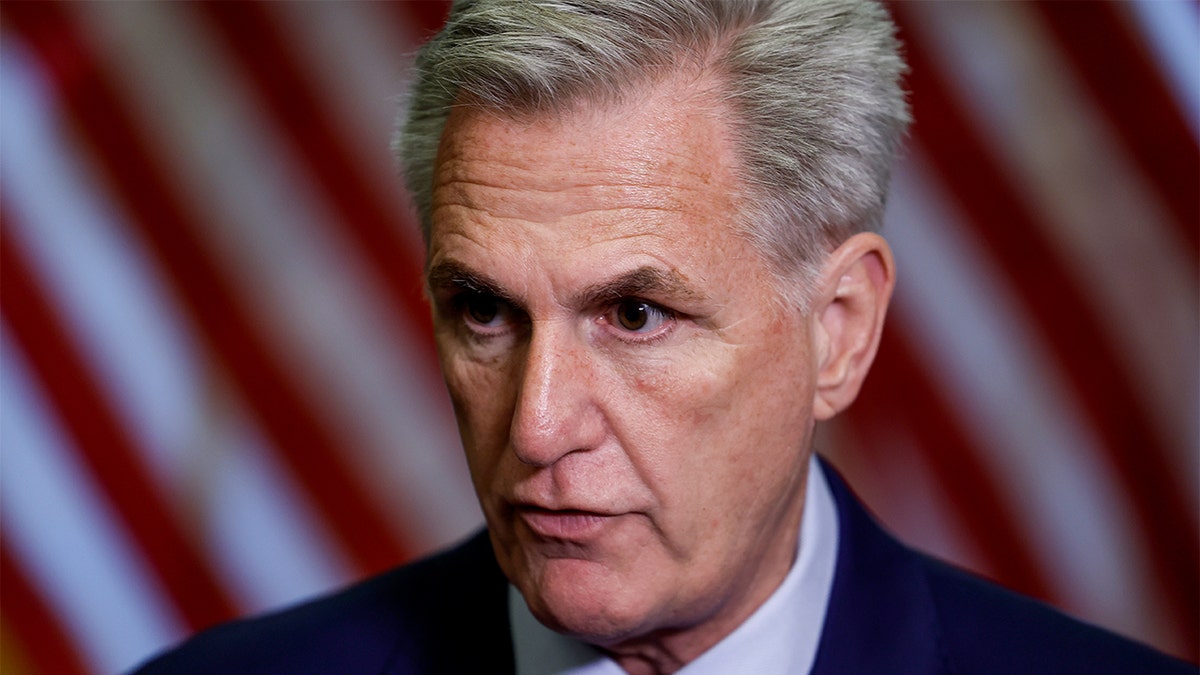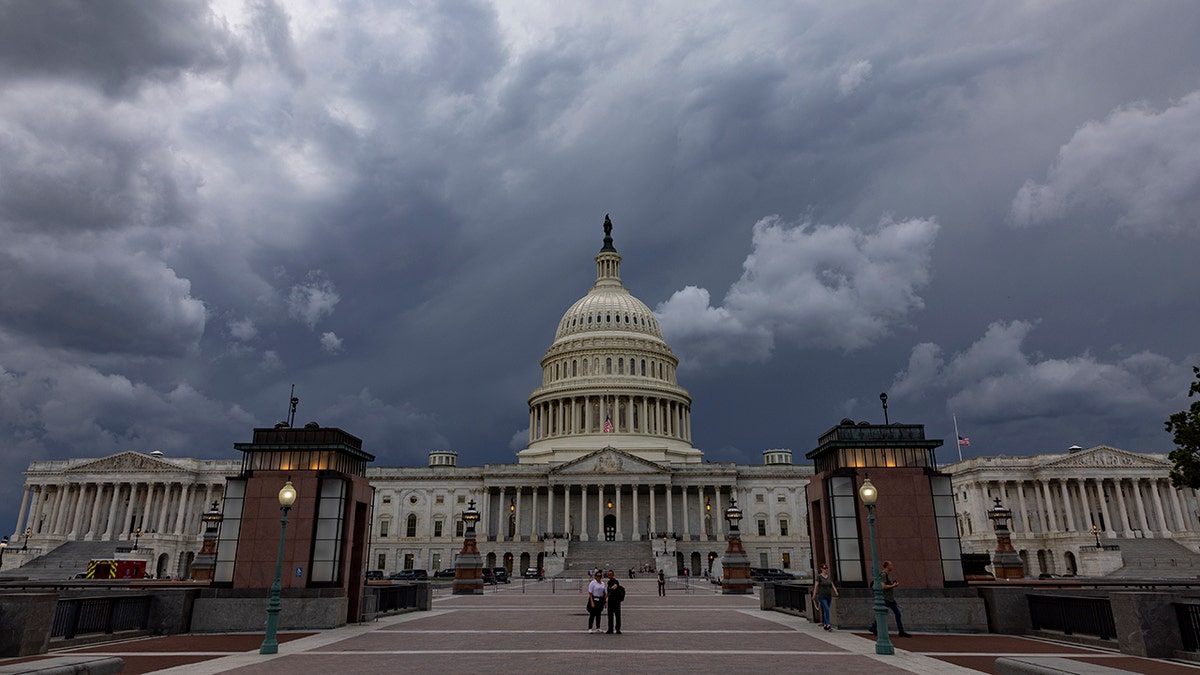There was some ballyhooing on Sunday that bipartisan Congressional leaders managed to avert a potential, partial government shutdown in the early morning hours of January 20.
First of all, fat chance.
Second of all, have you met Congress lately?
Third, there may not be enough time to avoid a shutdown before the 11:59:59 pm deadline to fund the government on January 19.
CRUNCH TIME: CONGRESS KICKS OFF 2024 STARING DOWN POTENTIAL SHUTDOWN
Spending covering four government spending bills expires at the end of the day on January 19. Those are bills dealing with Agriculture, Military Construction/VA, Energy & Water and Transportation/Housing & Urban Development.
The other eight annual spending bills run out at the end of the day on February 2, including defense and Homeland Security.
The main reason this proposal may not douse the government shutdown flames? There simply isn’t enough time.
FOX is told that House Speaker Mike Johnson (R-La.) intends to process the four bills due on January 19 individually. No appropriations bills are slated for activity this week. So everything likely comes up next week. When asked if the House might glom the bills together, a senior House leadership source said no. But, one would never rule out the possibility of lawmakers stitching a few of the bills together.
Even if the House was able to advance four bills next week successfully (and the GOP’s track record has not been great), that chews up time. It also eats up time to get the Senate to align with the House.

Speaker of the House Mike Johnson, R-La., right, and House Majority Whip Tom Emmer, R-Minn., conduct a news conference featuring remarks by college students about antisemitism on college campuses, in the U.S. Capitol on Tuesday, December 5, 2023. (Tom Williams/CQ-Roll Call, Inc via Getty Images)
So, they are running out of track. Fast.
The House could expedite the process by putting the bills on the floor via a procedure called “suspension of the rules.” This is where the bill goes directly to the floor and not through the more cumbersome House Rules Committee. The House also spends less time debating the bill on the floor. The tradeoff is that it requires a two-thirds vote to pass the bill. That means a coalition of Republicans and Democrats must team up to approve the measure. Ultra-conservatives won’t support an approach like that. But a large group of GOPers will. Couple that with most Democrats and the bills will probably pass with more than 300 votes – well above the two-thirds threshold required.
But what will the right say about Johnson? Remember, conservatives started to hammer former House Speaker Kevin McCarthy (R-Calif.) for passing bills with more Democrats than Republicans. That’s a strike against Johnson right there.
In addition, Johnson also opposes doing any sort of interim spending bill to avert a shutdown, known as a “continuing resolution” or “CR.”
We also haven’t even considered the Senate in this equation. The Senate can move lightning fast if all 100 senators are in agreement. In fact, much faster than even the House. But processing several spending bills by the book could consume days on end in the Senate. And remember, the House and Senate must be in alignment before Congress can send a bill to President Biden to sign.
MULTIPLE VENUES ON THE 2024 PRESIDENTIAL CAMPAIGN TRAIL
This is why the chances of a possible government shutdown remain high.
There are some conservatives who want a government shutdown. They will argue it’s best to shutter the government until there’s a border deal. In fact, it’s hard to believe there hasn’t been at least one government shutdown so far this Congress. So perhaps this the time when a shutdown hits.
And consider the bills which expire on January 19. Some lawmakers would say the bills on the clock right now cover the least important federal departments and programs. Agriculture and HUD is on the list. Not the Pentagon and Homeland Security.
So never rule out the possibility of a government shutdown – just because politically, it may just need to happen to satisfy some on the right or to make a point. Conservatives are particularly exercised about the border crisis. Some arch-conservatives say they won’t support funding the government until the border is secure – even though this deadline and set of bills has nothing to do with the border.
Perhaps not so ironically, Johnson may score some political points from skeptical conservatives if there’s a government shutdown. McCarthy wasn’t willing to go to the mat. Johnson could pick up applause right there. Right-wing House members in rock-ribbed Republican districts might score plaudits from some of their constituents if there’s a shutdown.
The concept of a government shutdown may seem perverse to bipartisan Congressional veterans. But that’s the nature of Congress in 2024.

Then-Speaker of the House Kevin McCarthy, R-California, speaks to reporters outside the Speakers Balcony at the U.S. Capitol Building on July 25. (Anna Moneymaker/Getty Images)
But just remember, no side has ever benefitted politically from a government shutdown. As for policy victories? There were a few of those after a series of shutdowns in the mid-1990s. But the reward is meager.
The topline agreement still fails to address how lawmakers might fund the government by February 2. That’s where a major calamity might unfold. If the sides are still dithering over funding the four appropriations bills due in January, there will be a complete government shutdown if Congress hasn’t addressed all 12 of the annual spending plans by February 2. And any political chits which Johnson could collect from the right over a shutdown could be dashed by any bipartisan agreement to fund the government.
Conservatives are already skewering Johnson because he adhered to the terms of the spring, 2023 debt ceiling pact McCarthy made with President Biden. The right wanted a new sheriff in town. But so far, they haven’t seen that things are operating much differently.
THE SPEAKER’S LOBBY: LEGISLATION ON COLLEGE SPORTS RELEGATED TO THE JV
This is why Johnson finds himself in a jam. He has a lot to sell to his members over the next few days.
As for the Democrats? They are pleased with the deal. Republicans didn’t force deeper cuts. And if the government shuts down? Democrats certainly don’t want that. But they believe that comports with the chaos which has dominated the GOP throughout the 118th Congress. A shutdown only underscores the bedlam – and gives Democrats more political ammo this fall as they try to cling to the Senate and flip control of the House.
Moreover, what if there is an interim spending deal which keeps the lights on? A so-called “CR?” Some Republicans have spoken about a CR for the remainder of fiscal year 2024 (September 30) which would renew old funding – but slash it by one percent across the board.

(Anna Moneymaker/Getty Images)
The Pentagon consumes nearly half of all discretionary spending which Congress doles out. As part of the $1.59 trillion topline agreement, the military would receive $866 billion. All other programs (remember this is ALL other federal programs): $704 billion. So a one percent across-the-board cut as a part of a floated year-old CR would exponentially damage the military the most. Senate Minority Leader Mitch McConnell (R-Ky.) has spoken out against this. Otherwise, a regular CR (just reupping the old funding without cuts, which Johnson adamantly opposes) benefits the Democrats. That means the federal government continues to operate well into fiscal year 2024 on a spending plan authored by Democrats. So while not optimal, some Democrats would take that deal.
So a possible government shutdown looms in just a few days.
This is the “Eastbound and Down” approach to government funding. Jerry Reed sang “Eastbound and Down,” the hit theme of the movie “Smokey and the Bandit.”
CLICK HERE TO GET THE FOX NEWS APP
“We’ve got a long way to go and a short time to get there,” sings Reed. “We’re gonna do what they say can’t be done.”
That sums up perfectly the conundrum facing lawmakers before next week’s deadline.
Read More: World News | Entertainment News | Celeb News
247
